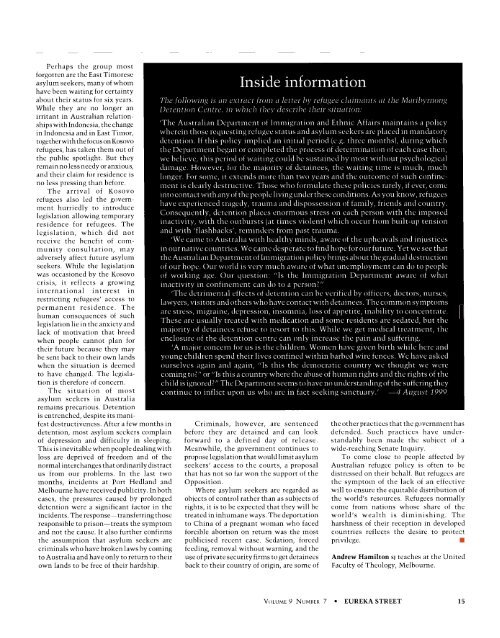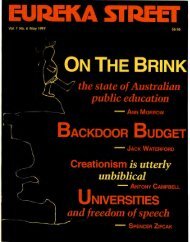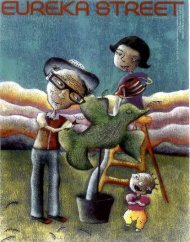1 - Eureka Street
1 - Eureka Street
1 - Eureka Street
- No tags were found...
Create successful ePaper yourself
Turn your PDF publications into a flip-book with our unique Google optimized e-Paper software.
Perhaps the group mostforgotten are the East Timoreseasylum seekers, m any of whomhave been waiting for certaintyabout their status for six years.While they are no longer anirritant in Australian relationshipswith Indonesia, the chan gein Indonesia and in East Timor,together with the focus on Kosovorefugees, has taken them out ofthe public spotlight. But theyrem ain no less needy or anxious,and their claim for residence isno less pressing than before.The arrival of Kosovorefugees also led the government hurriedly to introducelegislation allowing temporaryresiden ce for refu gees. Thelegisl a tion , w hich did n o treceive the ben efit of communitycon sultation , m ayadversely affect future asylumseekers. While the legislationwas occasioned by the Kosovocrisis, it refl ects a growingin t ern a tiona l inter est inrestricting refugees' access top erman ent residence. Thehuman consequences of suchlegislation lie in the anxiety andlack of motivation that breedwhen people cannot plan fo rtheir future because they maybe sent back to their own landswhen the situation is deem edto have changed. The legislationis therefore of concern.T h e situation of m ostasylum seekers in Australiaremains precarious. Detentionis entrenched, despite its m ani-fest destructiveness. After a few m onths indetention, m ost asylum seekers complainof depression and difficulty in sleeping.This is inevitable when people dealing withloss are deprived of freedom and of thenormal interchanges that ordinarily distractu s from our problem s. In the last twom onths, incidents at Port Hedland andMelbourne have received publicity. In bothcases, the pressures caused by prolongeddetention were a significant factor in theincidents. T he response-transferring thoseresponsible to prison- treats the symptomand not the cause. It also further confirmsthe assumption that asylum seekers arecriminals who have broken laws by comingto Australia and have only to return to theirown lands to be free of their hardship.Inside informationThe following is an extract from a letter by refugee claimants at the MaribyrnongDetention Centre. in which they describe their situation:'The Australian Department of Immigration and Ethnic Affairs maintains a policywherein those requesting refugee status and asylum seekers arc placed in mandatorydetention. If this policy implied an initial period (e .g. three months), during whichthe Department began or completed the process of determination of each case then,we believe, this period of waiting could be sustained by most without psychologicaldamage. However, for the majority of detainees, the waiting time is much, muchlonger. For some, it extends more than two years and the outcome of such confinementis clearly destructive. Those who formulate these policies rarely, if ever, comeinto contact with any of the people living undcrthcsc conditions. As you know, refugeeshave experienced tragedy, trauma and dispossession of family, friends and country.Consequently, detention places enormous stress on each person with the imposedinactivity, with the outbursts (at times violent) which occur from built-up tensionand with 'flashbacks', reminders from past trauma.'We came to Australia with healthy minds, aware of the upheavals and injusticesin our native countries. We came desperate to find hope for our future. Yet we see thatthe Australian Department of Immigration policy brings about the gradual destructionof our hope. Our world is very much aware of what unemployment can do to peopleof working age. Our question: "Is the Immigration Department aware of whatinactivity in confinement can do to a person?"'The detrimental effects of detention can be verified by officers, doctors, nurses,lawyers, visitors and others who have contact with detainees. The common symptomsarc stress, migraine, depression, insomnia, loss of appetite, inability to concentrate.These arc usually treated with medication and some residents arc sedated, but themajority of detainees refuse to resort to this. While we get medical treatment, theenclosure of the detention centre can only increase the pain and suffering.'A major concern for us is the children. Women have given birth while here andyoung children spend their lives confined within barbed wire fences. We have askedourselves again and again, "Is this the democratic country we thought we werecoming to? " or "Is this a country where the abuse of human rights and the rights of thechild is ignored?" The Department seems to have no understanding of the suffering theycontinue to inflict upon us who arc in fact seeking sanctuary.' -4 August 1999Criminals, how ever, are senten cedbefore they are detained and can lookforward to a defin ed day of release.Meanwhile, the government continues topropose legislation that would limit asylumseekers' access to the courts, a proposalthat has n ot so far won the support of theOpposition .Where asylum seekers are regarded asobjects of control rather than as subjects ofrights, it is to be expected that they will betreated in inhumane ways. The deportationto China of a pregnant wom an who facedforcible abortion on return was the m ostpublicised recent case. Sedation, forcedfeeding, rem oval without warning, and theuse of private security firms to get detaineesback to their country of origin, are som e ofthe other practices that the government hasdefended. Su ch practices have understandablybeen m ade the subject of awide-reaching Senate Inquiry.To com e close to people affected byAustralian refugee policy is often to bedistressed on their behalf. But refugees arethe symptom of the lack of an effectivewill to en sure the equitable distribu tion ofthe world's resources. Refugees normallycome from nations whose share of thew orld's wealth i s diminishing. Theharshness of their reception in developedcountries reflects the desire to protectprivilege.•Andrew Hamilton SJ teaches at the UnitedFaculty of Theology, Melbourne.V OLUME 9 N UMBER 7 • EUREKA STREET 15
















